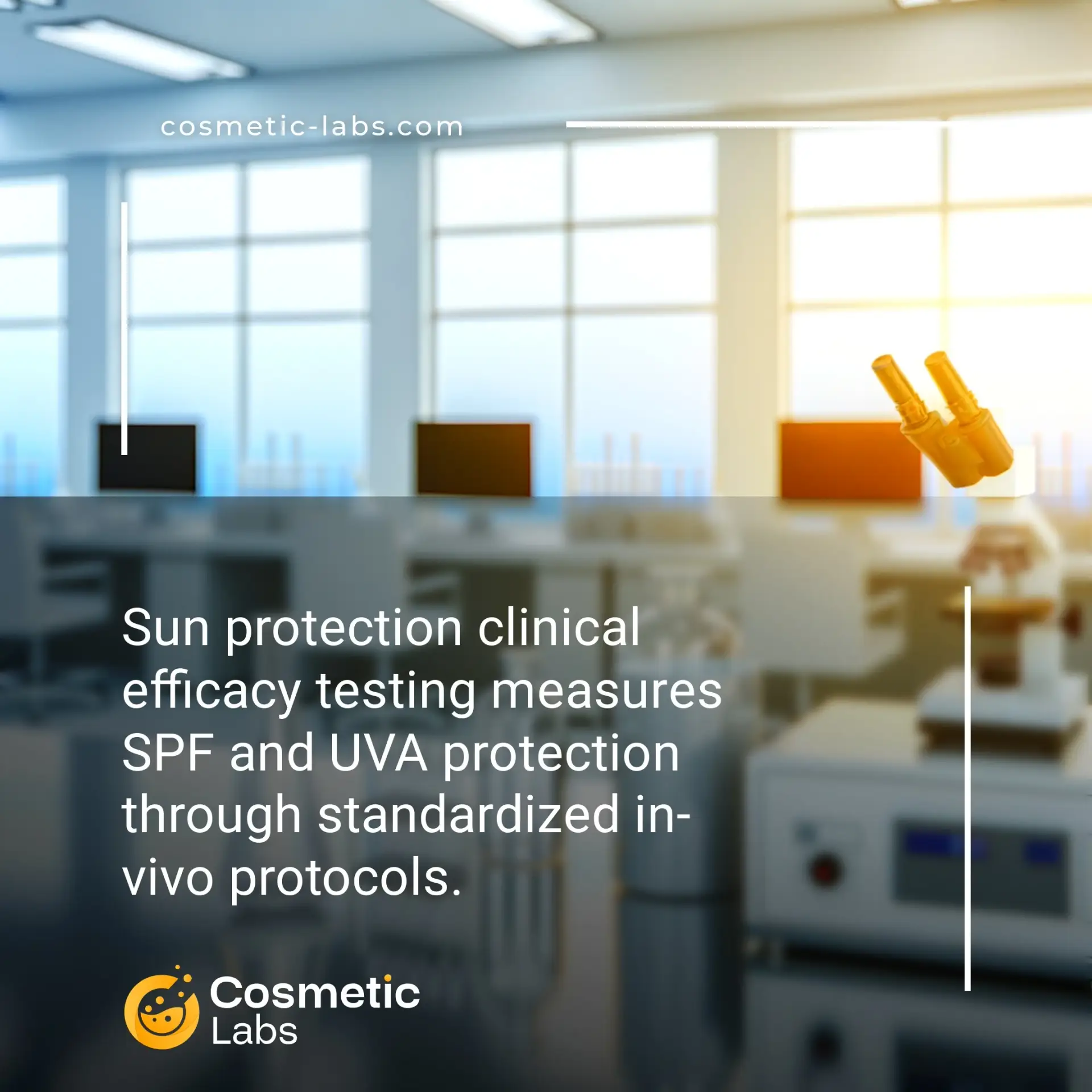Sun Protection Testing Services for Cosmetic Brands

What is Sun protection efficacy testing?
Sun protection clinical efficacy testing services measure how well your SPF products actually protect skin through standardized laboratory protocols and human volunteer studies. Labs conduct SPF testing using solar simulators that replicate UV radiation, applying precise amounts of product to test subjects’ backs and measuring minimal erythema dose before and after application. These tests also evaluate water resistance for 40 or 80 minutes, broad-spectrum UVA protection, and photostability to ensure your sunscreen claims meet FDA regulations and consumer expectations.
Why do you need this service?
Cosmetic brands use SPF verification testing to validate their sunscreen formulations meet FDA and international regulatory standards before market launch. Labs conduct in-vivo testing with human volunteers to measure actual protection factors, while water resistance protocols determine how long products maintain effectiveness during swimming or sweating. These studies generate the clinical data required for accurate labeling and regulatory submissions across global markets.
Who provides Sun protection efficacy testing services?
All cosmetic labs providing Sun protection efficacy testing services
There is no company providing these services at the moment.
Sun Protection Clinical Efficacy Testing Services
Cosmetic labs offer sun protection clinical efficacy testing services to validate SPF claims and UV protection performance for sunscreens and cosmetic products. These specialized tests provide the regulatory compliance data you need to market your products with confidence while meeting consumer safety expectations.
SPF Testing and UV Protection Validation
Labs conduct standardized SPF testing using human volunteers under controlled conditions to determine your product’s sun protection factor. The testing follows FDA and international protocols that measure how long skin protected by your product can be exposed to UV radiation without burning compared to unprotected skin.
Key testing parameters include:
- SPF value determination (2-100+)
- UVA protection assessment
- Water resistance testing (40 or 80 minutes)
- Broad spectrum verification
Results provide the documentation needed for product labeling and regulatory submissions across different markets.
Photostability and Performance Analysis
Testing facilities evaluate how your sunscreen formulation maintains protection over time through photostability studies. These tests expose products to controlled UV light to measure ingredient degradation and protection loss during typical use conditions.
Labs also run critical wavelength testing to verify broad spectrum claims and assess your product’s ability to protect against both UVA and UVB radiation. This data supports marketing claims about comprehensive sun protection.
Partner with verified cosmetic labs through our platform to access certified testing facilities that can validate your sun protection products and support your regulatory requirements.
Practical Applications of Sun Protection Clinical Efficacy Testing
Sun protection clinical efficacy testing applications validate SPF claims, measure UVA protection, and demonstrate photostability across diverse product formulations for regulatory approval and consumer confidence.
SPF Value Verification and Regulatory Compliance
Labs conduct in-vivo SPF testing using standardized protocols with 10-20 human subjects to determine actual protection factors. This testing measures minimal erythema dose (MED) on protected versus unprotected skin areas under controlled UV exposure. Results typically require 2-3 weeks and generate data packages for FDA, EU, and international regulatory submissions.
Photostability testing evaluates how UV filters maintain protection after light exposure. Labs use xenon arc solar simulators to expose products for specified durations, then measure remaining SPF values. Products must retain at least 90% of original SPF to pass photostability requirements.
| Test Type | Duration | Subjects/Samples | Primary Outcome |
|---|---|---|---|
| In-vivo SPF | 2-3 weeks | 10-20 subjects | SPF value (2-100+) |
| UVA Protection | 1-2 weeks | 10-15 subjects | UVA-PF ratio |
| Photostability | 3-5 days | 5-10 samples | % SPF retention |
| Water Resistance | 1 week | 10-20 subjects | Post-immersion SPF |
Product Development and Market Positioning
Brands use broad-spectrum testing to validate UVA protection claims alongside SPF measurements. Critical wavelength testing determines if products protect across the full UV spectrum (290-400nm). Labs measure transmission through product films using spectrophotometers, with critical wavelength values above 370nm qualifying for broad-spectrum labeling.
Water resistance testing involves 40 or 80-minute immersion protocols with controlled water temperature and movement. Subjects receive SPF testing before and after water exposure to determine protection retention rates. This data supports “water resistant” or “very water resistant” claims on product labels.
Ready to validate your sun protection formulations? Contact cosmetic labs on our platform for comprehensive SPF testing services and regulatory support.
